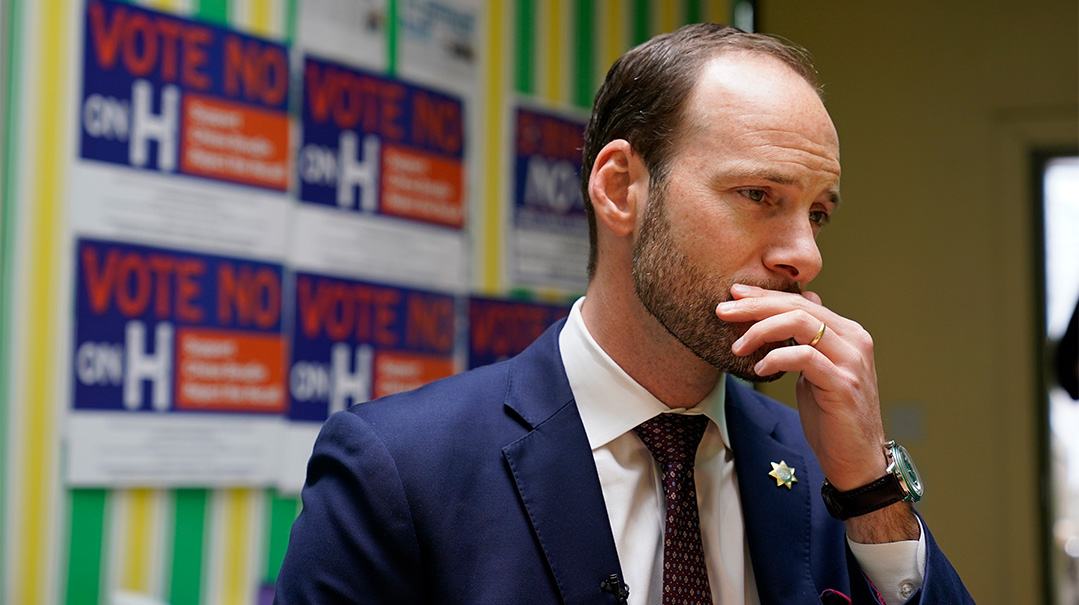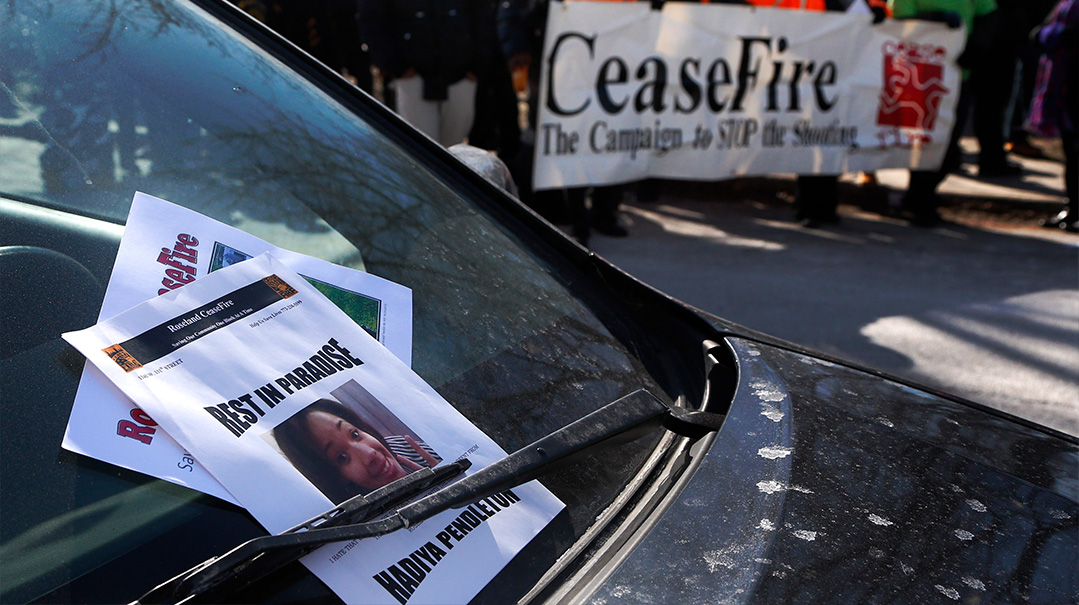Dems Get Wake-Up Call on Crime

As even liberals sour on progressive policies, Dems struggle to swing right

San Francisco DA Chesa Boudin, ousted in a recall election on June 7
Photo: AP Images
V
oters gave the Democratic Party another message last week about what they consider the most pressing issue facing the country, with the 2022 congressional midterms now only four and a half months away.
When one considers the headaches facing President Joe Biden and his party’s candidates, the first thing that comes to mind is the economy: inflation, rising interest rates, and the stock market slump. But the economy isn’t the only thing Democrats have to worry about.
Crime rates have surged, especially nonviolent crimes (theft, break-ins) and property offenses, which have left many voters feeling like they live in a Wild West with no law and order. Thefts have become so common that police often won’t even make an effort to intervene.
So what happened last week? San Francisco district attorney Chesa Boudin, a progressive Democrat elected in 2019 on a platform of criminal justice reform, was removed by voters in a recall election. His actions upon assuming office included eliminating cash bail, ending the practice of prosecuting minors in adult courts, reducing the prison population during the pandemic, and aggressive prosecution of police violence.
The results of the recall were stark: 55%–45% in favor of his removal, in one of the most left-wing districts in the country. The main charge against Boudin was that his easy-going approach to crime endangered public safety. Videos of brazen shoplifting in downtown stores drew national attention.
In this context, Eric Adams’s victory in the New York mayoral race last year — he ran on the tough-on-crime ticket — should have come as no surprise. But the results from San Francisco last week were much more revealing. If the wind has changed in progressive bastions such as New York and San Francisco, where Biden defeated Trump by over 50 percent, how will Democrats fare in swing states like Ohio, Wisconsin, Florida, and Arizona?
It’s important to note that the same evening Boudin was recalled saw the first round of the Los Angeles mayoral race, where Rick Caruso, running as a champion of law and order, receive more votes than Karen Bass, a progressive congresswoman who was on Biden’s short list for vice president. And while Caruso didn’t win outright — the two advanced to a November run-off — the trend is clear. In more and more places across the country, voters are voicing their concerns over crime.
“Defund the Police” Is Unpopular
Why is this important?
Across the United States, crime rates have surged in the wake of the coronavirus crisis. The reasons for this are complex; lockdowns led to increased rates of juvenile delinquency, which increased property offenses, and even violent crimes — a phenomenon the authorities have struggled to contain.
The May 2020 killing of George Floyd by two Minneapolis cops shocked the country and fueled the rise of a “Defund the Police” campaign — with supporters arguing that police budgets should be cut and the funds redirected toward social services and mental health programs, on the basis that mental health professionals might often deal with troubled individuals or families better than cops.
This campaign came to be overwhelmingly associated with the progressive wing of the Democratic Party. Republicans nevertheless seized upon the issue to attack all Democrats for being too soft on crime and wanting to cancel the police.
The GOP tactic seems to have borne fruit. A Gallup poll from early April found that for the first time since 2016, a majority of Americans say they worry “a great deal” about crime, while an ABC poll from later in the month showed that voters favor Republicans over Democrats on crime by 16 percent. Half of registered voters said they trusted Republicans more on the issue, compared to just 34 percent who favored Democrats.
Polls by the Economist and Morning Consult found that the slogan “defund the police” is unpopular and opposed by a clear majority of Americans. One can only recall Virginia Democratic congresswoman Abigail Spanberger’s prediction in November 2020 that if Democrats don’t change their tune, they’ll pay a heavy price in 2022. Spanberger, a former CIA agent, had managed to flip a red House district blue in 2018. But after barely retaining her seat in 2020, she warned her colleagues that the party’s socialistic and anti-police messaging would cost them down the road in toss-up constituencies where victory depends on crossover support.
This grim climate even led Biden to call openly to “fund the police” in his State of the Union Address. But can this appeal, important and direct as it is, make a difference? In the US’s decentralized system, the president’s say in how the country is run is very limited. Still, Biden’s words are symptomatic of a deep-seated fear among Democrats that they could be punished by voters in the midterms for failing on the issue of crime and personal safety, which are of primary concern to ordinary Americans of all political stripes.

Not Ideology, But Competence
The unseating of liberal San Francisco’s district attorney shows that these fears are well-founded. Is this the beginning of a change of heart in the Democratic Party, or an alarm bell for November?
University of Southern California professor Darry Sragow is a longtime California Democratic political strategist who managed three campaigns for governor and two for US Senate, and advised his party’s caucus in the State Assembly for eight years.
“One of the biggest takeaways from the outcome of the San Francisco district attorney recall is that, as usual, political insiders are misreading the results,” Professor Sragow tells Mishpacha. “San Francisco has always been a place that is off-beat, and it has always been a haven for people who prefer to march to their own drummer. That has earned the city a reputation for being progressive or liberal — or just plain wacky.
“But most San Franciscans have the same concerns everybody has. They want to get up in the morning and have a good job so they can pay their bills; they want their kids to go to good schools and have a bright future; and they want to live and work in safe neighborhoods.
“Is Boudin’s loss evidence that progressive policies are in retreat in a city with a reputation for being very progressive? No. It’s evidence that San Francisco voters want to face fewer threats — crime, visible homelessness — as they navigate their day-to-day lives. Voters can believe that our criminal justice system is unfair and in need of reform, and at the same time they can believe that violent repeat offenders ought not to be taking over the streets of their communities.”
Professor Sragow cautions against reading these results as evidence of a sea change in the party.
“Most Democratic voters, most swing voters, would prefer that the party come to its senses and realize that the citizens who will decide the outcome of the midterms believe their elected officials have failed them,” he says. “The issue isn’t ideology — the issue is competence.”
And Sragow warns that the problems plaguing cities like San Francisco are not going to recede in importance in voters’ minds before November.
“Crime and homelessness will definitely be issues in the fall elections,” he says. “And they need to be seen for what they are, namely widespread and unwelcomed evidence on the part of voters not just in San Francisco or California, but nationally, that everything around them is falling apart — a widespread sense of hopelessness, of the uselessness of politicians. [There can be] an appropriate discussion about how mental health professionals and others can step in to the benefit of both law enforcement and citizens in certain situations that may be easier to resolve without the presence of a uniformed armed police officer. Adding resources to those peaceful intervention efforts appeals to voters. But absolutely not at the expense of tying the hands or reducing the capabilities of law enforcement.”
Sragow’s prescription to Democrats for taking back control of the political debate is simple: Just listen.
“The best way Democrats can convince voters that the party is committed to increasing public safety is to acknowledge the absolutely legitimate fear and anger felt by past and present victims of injustice and at the same time acknowledge the entirely appropriate fear and anger felt by citizens who believe their very lives, and the lives of their loved ones, are jeopardized by ever rising criminal violence,” Sragow says. “The party and its candidates need to talk solutions, not ideology.”
It’s too early to say whether Professor Sragow’s advice will be followed or if Congresswoman Spanberger’s prophecy of doom will be borne out, but one thing is already clear: The progressive wing of the party has no intention of changing tack. If anything, the opposite is the case.
At the same, it’s evident that Biden has no control over the progressives, who are acting like an independent party. But the White House understands that what will determine the outcome of the midterms is first and foremost the economy. If by November inflation shows signs of slowing, and gas prices fall back to the $3 per gallon range, Democrats will be in a much more comfortable situation.
Otherwise, crime growing out of control certainly won’t help the situation, and Democrats may find themselves in a very tough spot.
(Originally featured in Mishpacha, Issue 915)
Oops! We could not locate your form.







